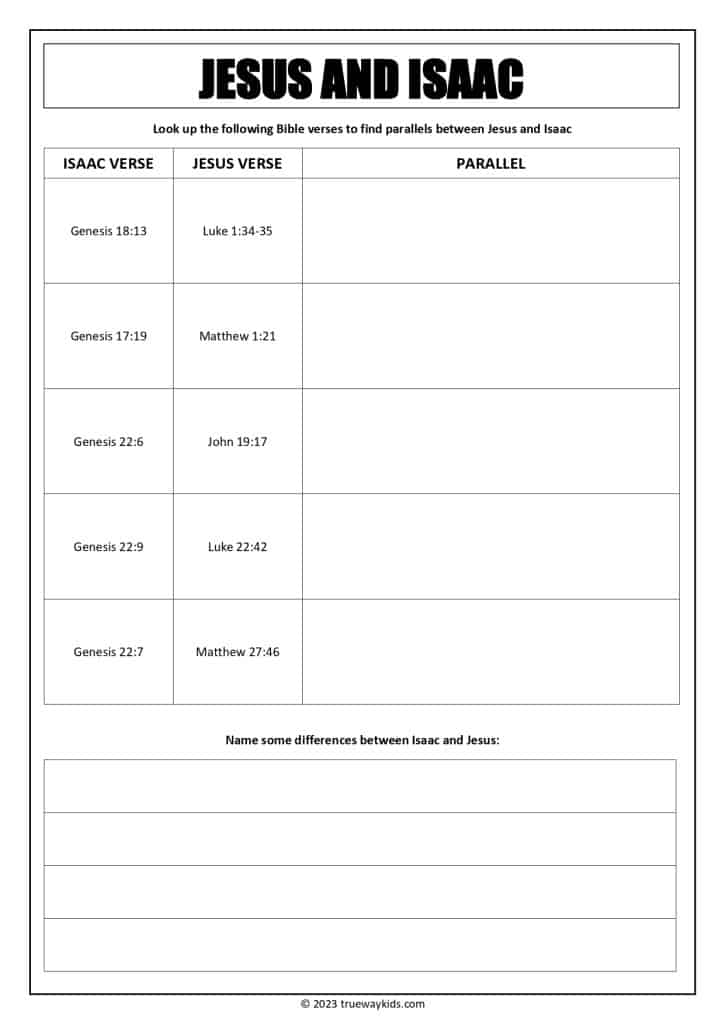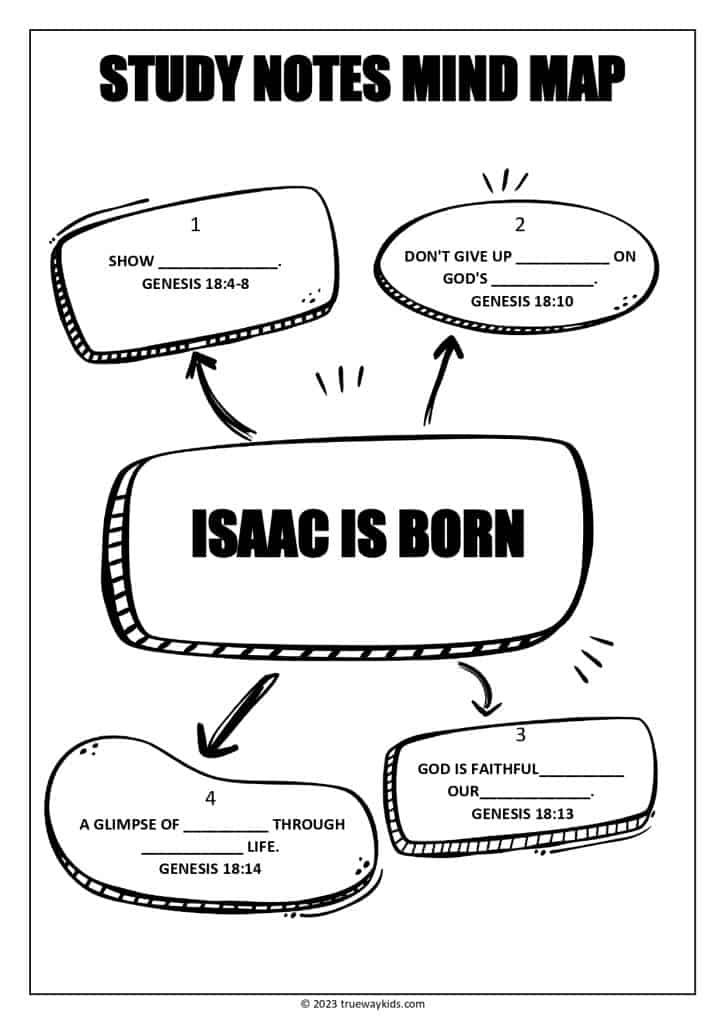In Genesis, God promises Abraham and Sarah they will have a son. This promise is fulfilled years later when Isaac is born to them in their old age.
This lesson relates to pre-teens and teens and by the end of this lesson, they should have learned about the following:
- God is faithful to His promises
- God is bigger than our mistakes
- Similarities between Isaac and Jesus
BIBLE READING: Genesis 18 & 21
MEMORY VERSE: “Is anything too hard for the Lord?” – Genesis 18:14a
DOWNLOAD THE FREE PRINTABLE LESSON

BIBLE STUDY NOTES FOR TEENS
BACKGROUND TO THE PASSAGE
In Genesis 18:1-15, three visitors appear to Abraham and Sarah. Abraham warmly welcomes them into his tent, offering them a meal and washing their feet as a sign of hospitality.
One of the visitors, reminds Abraham of the promise God made earlier in their journey (Genesis 17) that he would become the father of many nations. When Sarah hears this conversation from inside her tent, she laughs to herself due to her old age. Nevertheless, God reaffirms His promise and tells them that their son would be born in a year.
The promise is finally fulfilled when Isaac is born just a few chapters later (Genesis 21:1-7). Through these events God shows His faithfulness by fulfilling His promises through miraculous means despite all odds.
MAIN POINTS
1. SHOW HOSPITALITY – GENESIS 18:4-8
When the Three Visitors arrived at Abraham’s tent in Genesis 18, he hurried to show them hospitality. He urged his wife, Sarah, to make bread for them and then sent for a calf to be slaughtered and prepared for the meal. During their time together, Abraham showed great respect towards the visitors and asked if he could serve them water so they could wash their feet. He also asked that Sarah make cakes so they could rest while they ate.
This story teaches teens about the importance of showing hospitality. Hebrews 13:2 says, “Do not neglect to show hospitality to strangers, for thereby some have entertained angels unawares.” Abraham had no idea when he first welcomed the Three Visitors that they were actually messengers of God. However, his act of hospitality led to an amazing encounter.
Abraham’s example is one that we should follow. Being hospitable can be as simple as holding a door open for someone, offering them food or drink, and spending quality time with them.
Yes. Showing hospitality can often feel like an inconvenience, especially when unexpected guests arrive. Sharing our personal space and time in our busy schedules can be challenging. We may even worry we have little to offer or no common interests with the person.
But it’s important to remember that we never know when divine appointments made by God are put in front of us. We can never be sure if any particular person is sent from the Lord, so treating all people with respect and hospitality is wise.
2. DON’T GIVE UP WAITING ON GOD’S PROMISES – GENESIS 18:10
In Genesis 12:1-4, God makes a promise to Abraham. He promises to make Abraham’s descendants as numerous as the stars in the sky and give them Canaan’s land.
Abraham and Sarah were already very old when God made this promise to them. Abraham was already 75 years old, and Sarah was 65. At their age, it seemed impossible for them to have a son. However, God promised that He would give them a son, despite their advanced age and the fact that they were both barren.
They had waited for years with no sign of it coming to pass, and as their age advanced, it was difficult for them to imagine that there would ever be a son born to them.
When Sarah overheard the conversation between Abraham and the three visitors in Genesis 18, she laughed. This wasn’t because of any joy or amusement but because of how ridiculous it sounded to her in their old age. She saw them as too old to have a child; it seemed impossible to her that they could still be blessed with a son.
It is easy for us to doubt God’s promises as time goes by. We may become impatient or think our prayers need to be answered faster. This can be especially true when the promise seems impossible from our point of view. Sarah certainly felt this way.
Yet we see, 25 years later, that God did the impossible! At age 100, God gave Abraham and Sarah their firstborn son, Isaac. The birth of Isaac was nothing short of miraculous.
3. GOD IS FAITHFUL DESPITE OUR IMPERFECTION – GENESIS 18:13
Abraham acted wrongly numerous times throughout his life. One of the most notable incidents occurred when Abraham feared for his life and offered his wife Sarah to the Pharaoh of Egypt as a concubine to save himself (Genesis 20:1–16). This deception showed that Abraham was willing to put his own safety ahead of even his family’s well-being.
Another time, Abraham and Sarah tried to help things along by having Abraham’s servant Hagar have a child with Abraham, but it didn’t work out as they had planned (Genesis 16:1–16).
Nevertheless, despite Abraham and Sarah’s mistakes and missteps, God kept His promise to give him a son. This passage teaches us about the faithfulness of God. No matter how often we make mistakes, God is true and faithful to His promises.
We should not use this as an excuse to sin. As James 2:17 says, “In the same way, faith by itself, if it is not accompanied by action, is dead.” We must obey God’s commands out of love for Him and trust that He will always be faithful to us. But this passage reminds us of Romans 3:3-4a, “What if some were unfaithful? Does their faithlessness nullify the faithfulness of God? By no means! Let God be true though everyone were a liar.”
God is faithful. This should encourage us to quickly repent and return to Him when we do wrong.
4. A GLIMPSE OF JESUS THROUGH ISAAC’S LIFE – GENESIS 18:14
Isaac is a picture of Christ in many ways. First, both Isaac and Jesus were born miraculously; when Sarah heard the news of her pregnancy with Isaac, she was already well past child-bearing years (Genesis 21:1-2). By contrast, Mary was only a young teenage girl when God chose her to be the mother of Jesus (Luke 1:26–38) through another miraculous birth.
Second, both Isaac and Jesus were willing to sacrifice themselves for God’s plan. Both carried wood on their backs up the mountain. In the case of Isaac, he was willing to lay down his life as an offering when God asked Abraham to do so (Genesis 22:2). Likewise, Jesus willingly went to the cross as an offering for all of us (John 10:17–18).
Finally, both Isaac and Jesus were resurrected. In the case of Isaac, it was only a spiritual resurrection; he had been tied up and placed on the altar by Abraham, but God intervened before Isaac could be sacrificed by providing a substitute ram (Genesis 22:12). Jesus was the Substitute sacrificed for Isaac, Abraham, us and everyone who believed. Jesus was raised from the dead by the power of God and opened the path to eternal life for all who believe in Him (John 11:25).
CONCLUSION
The story of Abraham, Sarah and Isaac is a reminder of the unwavering faithfulness of God. After 25 years of waiting and with no hope left in sight, God fulfilled His promise to Abraham and Sarah to bless them with a son they named Isaac. Despite their mistakes, imperfections and even their attempts to take matters into their own hands, God kept His promise.
The story of Isaac is also a beautiful picture of the life and sacrifice of Jesus. Jesus was the Promised son, willing to give Himself up for us on the cross. He rose again so that all who believe in Him may have eternal life.
Read full notes in the pdf lesson
YOUTH GAMES AND ACTIVITIES FOR Isaac is Born
SIMPLE INGREDIENTS
This game provides a fun and creative way for teens to work together. The challenge is to create a meal using three simple ingredients. Teams must work together to mix, chop, shape, arrange and plate the ingredients within a set time limit.
Steps:
- Gather teams of two players each and assign them their three mystery ingredients.
- Set a time limit for each team (e.g., 10 minutes).
- Instruct the teams to start prepping their ingredients as quickly as possible by cutting, stirring and shaping them into interesting creations.
- Once they have completed prepping their meal, they can begin plating it in a visually appealing way while also keeping an eye on taste balance and flavour combinations.
- When finished, ask teams to present their creations to the judge who will then pick the winner based on which meal tastes best and looks the most appealing!
Talk about how Abraham rushed to prepare a meal for his visitors.
THE WAITING GAME
This game is perfect for teens who enjoy a challenge. The goal of this game is to see how long each participant can last without moving.
Steps:
- Space players around the room away from each other.
- Set a timer and let it run until all players can no longer last without moving.
- As soon as one player makes a move, they are eliminated from the game, and the remaining players must continue to keep still until someone else makes a move or the timer ends.
- If the game is too easy, make them stand in a different position such as on one leg or in a squat.
- At the end of the timer, whoever was able to last the longest wins!
DON’T LAUGH
The goal of this game is to see how long each participant can last without laughing.
Steps:
- Gather a group of at least two players and make sure any necessary rules are explained before beginning the game (e.g., what type of things they should avoid saying or doing that could potentially cause them to laugh).
- Set a timer and begin playing a short turn-based game, such as charades. Players must attempt to act out whatever has been assigned without them or their teammates laughing!
- If a player laughs during the game, they are eliminated from their team and cannot continue to play; if more than one player laughs, the round ends immediately, and the other team takes over.
Free printable Teen Worksheets in the lesson pack








DOWNLOAD THE FREE PRINTABLE LESSON

View lesson for other age groups
Translations

Sign Up for FREE Weekly Bible Lessons!
Get a free printable Bible lesson delivered to your inbox every Friday—perfect for teaching and engaging with your children.
Every lesson includes lesson guides, story, worksheets, colouring pages, craft and more.
Simply enter your details below to start receiving these valuable resources for free!



